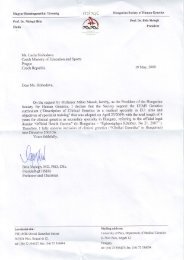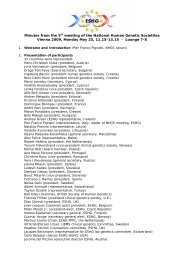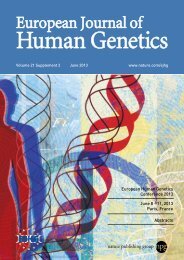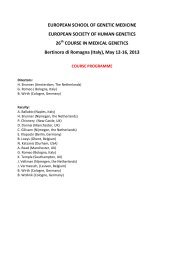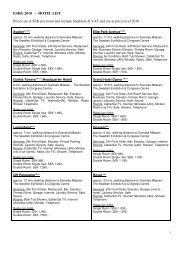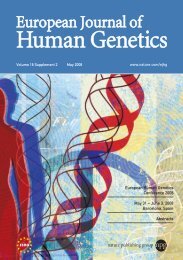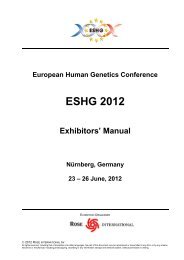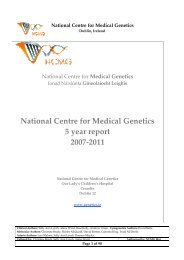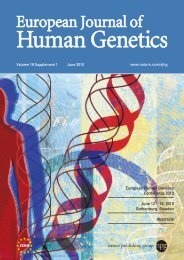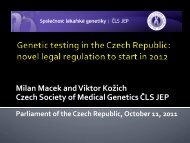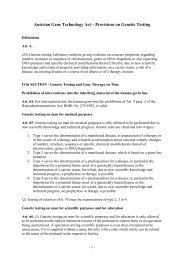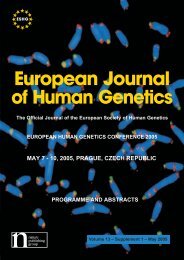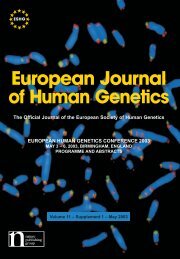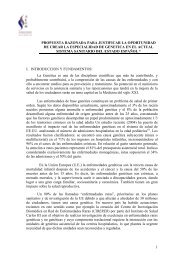2009 Vienna - European Society of Human Genetics
2009 Vienna - European Society of Human Genetics
2009 Vienna - European Society of Human Genetics
You also want an ePaper? Increase the reach of your titles
YUMPU automatically turns print PDFs into web optimized ePapers that Google loves.
Complex traits and polygenic disorders<br />
ethiopathology <strong>of</strong> MSD is largely unknown, but genetic disposition<br />
may be one <strong>of</strong> several risk factors. Since pain is a major symptom <strong>of</strong><br />
MSD, and polymorphisms in the catecholamine O-Methyltransferase<br />
(COMT) gene are associated with COMT enzymatic activity and pain<br />
sensitivity, we assumed that COMT polymorphisms could be associated<br />
with MSD.<br />
Probands: 147 patients with MSD and 94 age and gender matched<br />
healthy controls participated in this study. The inclusion criteria for<br />
MSD were in accordance to the structured clinical interview (SCID) <strong>of</strong><br />
the diagnostic and statistical manual <strong>of</strong> mental disorders (DSM IV).<br />
Genotyping: DNA from EDTA blood was genotyped for single nucleotide<br />
polymorphisms (SNPs) within the COMT locus by polymerase<br />
chain reaction (PCR) and restriction enzyme analysis. The distribution<br />
<strong>of</strong> COMT SNP alleles, genotypes and haplotypes was compared between<br />
patients and controls.<br />
Results: None <strong>of</strong> the investigated SNPs, including the functionally relevant<br />
common SNP in codon 158 (Val158Met), showed a statistically<br />
significant allelic, genotypic or haplotypic association with MSD.<br />
Discussion: In previous studies, convincing evidence was obtained for<br />
a contribution <strong>of</strong> single SNPs and SNP haplotypes <strong>of</strong> the COMT locus<br />
to differences in the human experience <strong>of</strong> pain and to the risk <strong>of</strong> developing<br />
temporomandibular disorder (TMD). In contrast to these studies,<br />
COMT polymorphisms do not seem to play a relevant role as major<br />
genetic risk factors for MSD.<br />
P09.011<br />
Association analysis <strong>of</strong> xenobiotic-metabolizing gene<br />
polymorphisms with asthma in Volga-Ural region <strong>of</strong> Russia<br />
Y. Fedorova 1 , A. Karunas 1 , N. Ramazanova 2 , O. Gra 3 , I. Goldenkova-Pavlova 3 ,<br />
E. Khusnutdinova 1 ;<br />
1 Institute <strong>of</strong> Biochemistry and <strong>Genetics</strong>, Ufa, Russian Federation, 2 Bashkir<br />
Medical State University, Ufa, Russian Federation, 3 Vavilov Institute <strong>of</strong> General<br />
<strong>Genetics</strong>, Moscow, Russian Federation.<br />
Asthma is a chronic inflammatory disorder <strong>of</strong> the airways in which<br />
many cells and cellular elements play a role. The pathogenesis and<br />
etiology <strong>of</strong> asthma are very complex. Some studies have shown an<br />
association between asthma and polymorphisms <strong>of</strong> enzymes that<br />
play an important role in the biotransformation <strong>of</strong> xenobiotics. Using<br />
allele-specific hybridization on the biochip we have investigated the<br />
allele and genotype distribution <strong>of</strong> 13 polymorphisms in eight genes<br />
(CYP1A1, CYP2D6, GSTT1, GSTM1, MTHFR, NAT2, CYP2C9 and<br />
CYP2C19). The study was performed in 264 patients with bronchial<br />
asthma and 201 nonasthmatic individuals from Volga-Ural region <strong>of</strong><br />
Russia. Biochips were prepared in Engelhardt Institute <strong>of</strong> Molecular Biology,<br />
Russian Academy <strong>of</strong> Sciences (Biochip-IMB, Russia). Significant<br />
differences in NAT2 allele and genotype frequencies have been found<br />
between asthma patients and control group <strong>of</strong> Russian ethnicity. The<br />
frequency <strong>of</strong> slow *5/*5 genotype was lower in asthma patients than in<br />
healthy subjects (OR=0,49; 95%CI 0,26-0,92; p=0,026). On the contrary<br />
the Tatars had significant higher frequencies <strong>of</strong> *5 allele and *5/*5<br />
genotype <strong>of</strong> NAT2 gene in patients than in control group (OR=1,54;<br />
95%CI 1,01-2,35; p=0,045; OR=3,29; 95%CI 1,31-8,23; p=0,008). It is<br />
known that polymorphic NAT2 status varies widely between individuals<br />
and ethnic groups. Both rapid and slow N-acetyltransferase genotypes<br />
have been associated with the risk <strong>of</strong> several diseases in a number<br />
<strong>of</strong> populations. These observations, together with ethnic variation in<br />
the ratio <strong>of</strong> slow and rapid acetylators, suggest that NAT2 genotypes<br />
may partially explain asthma risk in different populations in Volga-Ural<br />
region <strong>of</strong> Russia.<br />
P09.012<br />
ORmDL3 haplotype is associated with asthma in an italian<br />
familial collection.<br />
M. D. Bettin1 , G. Malerba1 , N. Klopp2 , E. Rodriguez2 , H. Grallert2 , N. Lindemann2<br />
, L. Xumerle1 , R. Galavotti1 , C. Bombieri1 , E. Trabetti1 , T. Illig2 , P. F. Pignatti1<br />
;<br />
1Section <strong>of</strong> Biology and <strong>Genetics</strong>, Department <strong>of</strong> Mother and Child, Biology-<strong>Genetics</strong>,<br />
Verona, Italy, 2Institute <strong>of</strong> Epidemiology, Helmholtz Zentrum München,<br />
München, Germany.<br />
Asthma is a complex disease with genetic and environmental components.<br />
In 2007 the first Genome Wide Association study for asthma in English<br />
and German subjects (M<strong>of</strong>fat MF, Nature 2007;448:470) reported a<br />
strong association with 17q21 locus including the ORMDL3 gene. This<br />
finding has been already replicated in different populations.<br />
The association <strong>of</strong> 4 SNPs (rs8067378, rs7216389, rs3859192,<br />
rs11650680) in the candidate locus with susceptibility to asthma was<br />
investigated in Italian families with young asthmatic individuals (



